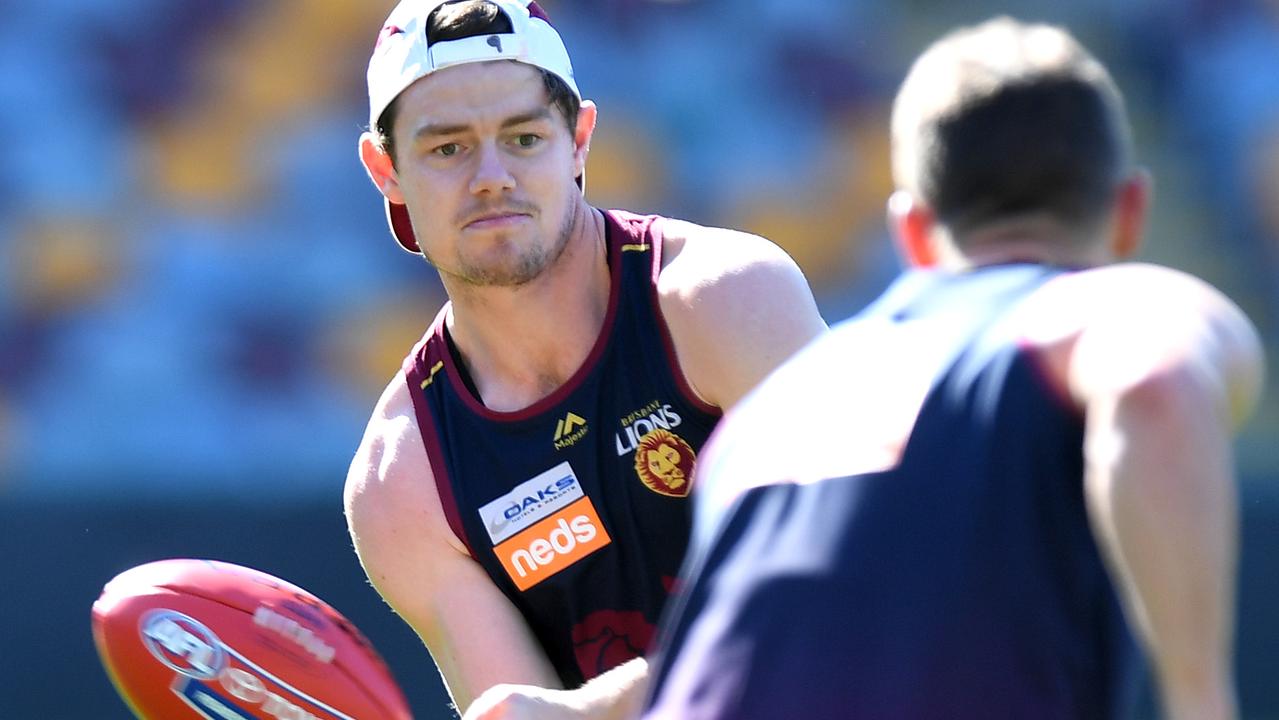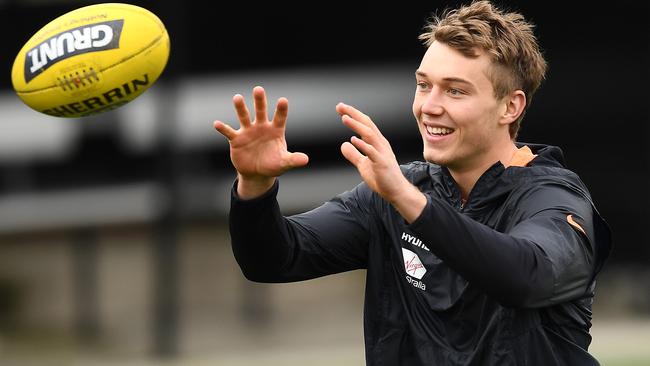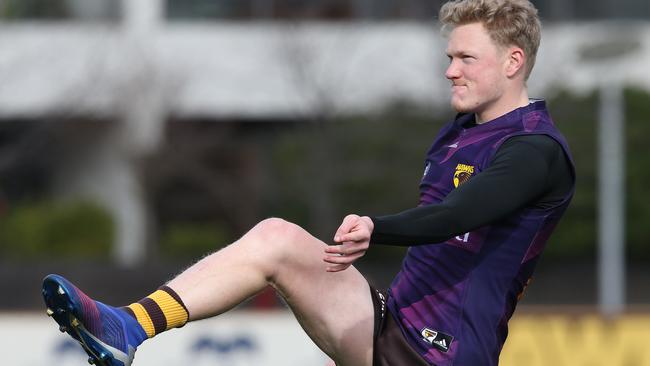KFC SuperCoach AFL scoring system explained
Kicks, marks and goals all add points to your SuperCoach total. But that’s just the start of the story. See all the key stats and which players score from them.
Supercoach
Don't miss out on the headlines from Supercoach. Followed categories will be added to My News.
There is more to scoring points in KFC SuperCoach than kicks and handballs.
But it’s a pretty good start.
AFL stats provider Champion Data has spent years refining its ranking points system — exclusive to SuperCoach — to reward the stats that help teams win games.
The short version is that winning your own footy and hitting targets when you use it are the foundation of a great SuperCoach scorer.
Here’s a breakdown of the key stats in the SuperCoach scoring formula, and which players score from each source.
DISPOSALS
Bulldog Jack Macrae led the AFL for disposals last season with 769 at an average of 33.4 a game. It’s no coincidence he was the topscoring midfielder in SuperCoach, averaging 123 points.
Look for players who use the ball well and kick more than handball. Effective long kicks are worth more than short passes. Adelaide’s Matt Crouch ranked third overall for disposals in 2019 but his SuperCoach scores suffered from a 0.77 kick-to-handball ratio.

Rebounding defenders rate well for effective kicks, with Tom Stewart, Daniel Rich and Jake Lloyd topping the league averages last year.
SuperCoach scoring:
Effective kick = 4 points
Effective handball = 1.5 points
Ineffective disposal = 0 points
Clanger disposal = minus 4 points
CONTESTED POSSESSIONS
SuperCoach loves players who win their own footy — that’s why Patrick Dangerfield, Nat Fyfe and Patrick Cripps are SuperCoach superstars. Fyfe and Cripps ranked No.1 and No.2 in the AFL in this stat last season. Interestingly, Brodie Grundy also ranked in the top 10 (ninth).
Tiger Tom Lynch topped the AFL for contested marks, and 20-year-old Bulldog Aaron Naughton was No.2 with a bullet.
SuperCoach scoring
Hardball get = 4.5 points
Loose ball get = 4.5 points
Contested mark = 6 points

GOALKICKING
Kicking goals is a great source of SuperCoach points, but it’s not as straightforward as you might think. Jeremy Cameron kicked 76 goals last season to win the Coleman Medal and averaged 92.8 points — impressive, but ranked only 17th among SuperCoach forwards.
That’s why you won’t see a lot of key forwards in SuperCoach teams and more mid-forward types who can get up the ground and not rely solely on kicking goals to score well.
Having said that, timing can be everything. Cameron kicked nine goals against Gold Coast in Round 23 — SuperCoach grand final day — to score 152 points.
SuperCoach scoring
Goal = 8 points
Behind = 1 point
Score assist = 3 points
INTERCEPTS
You only need to watch Richmond’s run to the 2017 and 2019 flags to see how important winning the ball back off the opposition is in the modern game. As a result, it is one of the most rewarded stats in SuperCoach.
Last season Eagle Jeremy McGovern and Giant Phil Davis topped the AFL for intercept marks last season, while McGovern was No.1 for contested intercept marks ahead of Hawk James Sicily. Hopefully Alastair Clarkson leaves Sicily at half-back all year.
SuperCoach scoring
Intercept mark = 4 points
Contested intercept mark = 8 points

HITOUTS
The SuperCoach scoring formula was updated several years ago to more effectively reward ruck prowess, removing any points for hitouts that don’t go to a teammate.
It’s no surprise ruck goliaths Max Gawn (286) and Brodie Grundy (268) were top-two for effective hitouts last season. Perhaps surprisingly, Gold Coast’s Jarrod Witts (261) came in third — but his SuperCoach average of 99.7 was very respectable.
SuperCoach scoring
Hitout to advantage = 5 points
Hitout = 0 points
Sharked hitout = minus 1 point
FREE KICKS
The free kick count also impacts SuperCoach scores. This is another scoring source for Michael Walters, who won 50 frees last season, the most in the AFLand one more than skipper Nat Fyfe. Max Gawn came in third.
Giving away free kicks is a great way to lose SuperCoach points. Our tip: Don’t pick Shane Mumford. He gave away 78 frees in 2019 and won just 35.
Giving away a 50m penalty is a SuperCoach disaster, but fortunately no player last season gave away more than five (Eric Hipwood and Shai Bolton).
SuperCoach scoring
Free kick for = 4 points
Free kick against = minus 4 points
50m penalty against = minus 8.5 points
MORE SUPERCOACH NEWS:
Quick guide to picking a winning KFC SuperCoach AFL team
Seven players you will need in your SuperCoach team this year
Jonathan Brown learns from rookie mistakes when picking 2020 SuperCoach AFL team
TACKLES
Another key metric to team success and a good way for your SuperCoach players to stay in the game even if they aren’t having the best day. Saint Jack Steele (164 at an average of 8.2 a game) just edged Elliot Yeo (161) as the AFL’s top tackler in 2019, with Dayne Zorko third. If Steele is freed up from tagging roles this year he could boost his SuperCoach average from 95,
SuperCoach scoring
Tackle = 4 points
AND MORE...
There are more than 50 different stats in the SuperCoach scoring formulat and adjustments for the state of the game. Every AFL match is worth roughly 3300 SuperCoach points so having 15 key disposals in a low-scoring arm-wrestle could score as well as 40 touches in a free-flowing shootout (both matches are worth four points on the ladder, after all).
Matchwinning plays in close finishes also receive a scoring bonus (Michael Walters took full advantage last season when he kicked the winning score two weeks in a row). This also explains why there are slight adjustments to score after the final siren.
Originally published as KFC SuperCoach AFL scoring system explained


